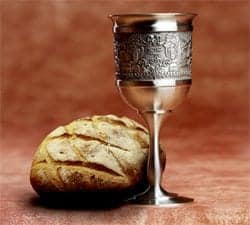The Bible teaches us that we as Christians partake of Christ. When we come to this Table, we partake of His body, and of His blood. But we do not partake of Christ in some isolated fashion, as though it were possible to partake of one narrow portion of Him. We partake of totus Christus, all of Christ. All that He is, and all that He has done and will do, and all that He has united Himself to, becomes ours through His grace.
All that He is: He is the resurrected Lord. We are partaking of His body and blood, but we are not doing this with a dead body. He lives, and He lives forever—death no more has mastery over Him. We cannot come to the Table and in any way reinstitute that death which was buried forever. We partake of the living Christ, Lord of heaven and earth.
All that He has done or will do: we are told by the apostle Peter that when we go through fiery trials, we are partaking of Christ’s sufferings (1 Pet. 4:13-14). There is a genuine reciprocity here. All that we go through for His sake, He partakes of (they are His sufferings), and all that He went through for our sake, we partake of (they are our actions, our obedience. Theologians refer to this latter reality as the active obedience of Christ imputed to us—we partake of His obedience, all of it.)
All that He is united to: if we partake of Christ, and Christ partakes of my neighbor, then I am partaking of my neighbor. This is the meaning of the one loaf. You are partaking of the body of Christ, and you are the body of Christ. As you eat and drink, you are eating and drinking one another. You eat and drink the body and blood of Christ because you are the body and blood of Christ.
What does this mean? There are three answers to the question—faith, hope, and love—but the greatest is love.
So come, and welcome, to Jesus Christ.


